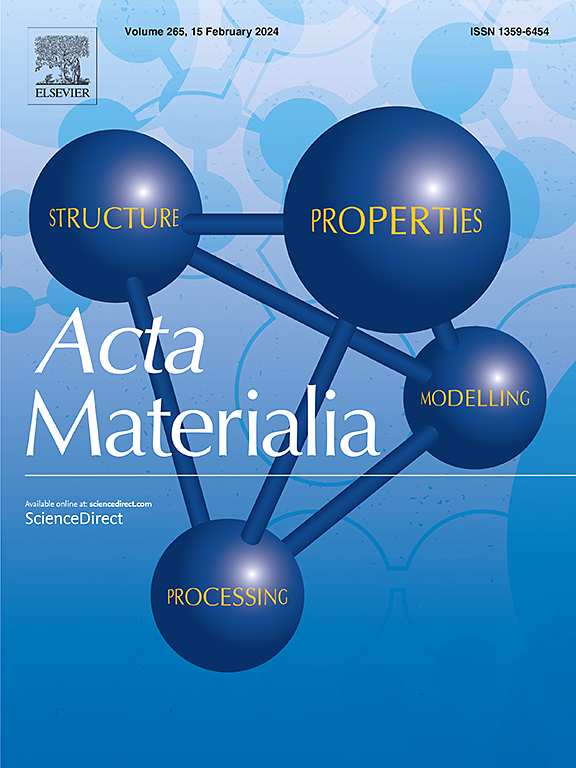基于氧化锆的形状记忆陶瓷的晶体对应和变体选择:来自EBSD映射的见解
IF 8.3
1区 材料科学
Q1 MATERIALS SCIENCE, MULTIDISCIPLINARY
引用次数: 0
摘要
先前对氧化锆陶瓷中马氏体相变的研究表明,基于晶格不变剪切最小化的特定晶格对应是优先选择的。然而,这些结论很大程度上是从有限的数据集得出的,主要是通过透射电子显微镜获得的。在这项工作中,我们采用先进的电子背散射衍射(EBSD)方法统计分析了ZrO₂-CeO₂合金中马氏体变体的分布。通过利用解决四边形氧化锆中长期存在的伪对称问题的新技术,我们证明了所有24种可能的马氏体变体同时存在,包括三种晶格对应和两种不同的取向关系。我们的研究结果挑战了单一主导对应控制转化的传统假设,并揭示了自我调节机制在变异选择中的重要作用。这些结果为研究控制氧化锆马氏体相变的晶体学因素提供了新的见解,并为形状记忆陶瓷的微结构设计开辟了新的途径。本文章由计算机程序翻译,如有差异,请以英文原文为准。


Crystallographic correspondences and variant selection in zirconia-based shape memory ceramics: Insights from EBSD mapping
Previous studies of the martensitic transformation in zirconia ceramics have suggested a preference for specific lattice correspondences based on lattice invariant shear minimization. However, these conclusions have largely been drawn from limited datasets, primarily obtained via transmission electron microscopy. In this work, we employ advanced Electron Backscatter Diffraction (EBSD) methods to statistically analyze the distribution of martensite variants in ZrO₂-CeO₂ alloys. By leveraging novel techniques that resolve the long-standing pseudosymmetry problem in tetragonal zirconia, we demonstrate the simultaneous presence of all twenty-four possible martensitic variants, encompassing three lattice correspondences and two distinct orientation relationships. Our findings challenge the conventional assumption that a single dominant correspondence governs the transformation, and reveal a significant role for self-accommodation mechanisms in variant selection. These results offer new insights into the crystallographic factors governing martensitic transformations in zirconia and open new pathways for microstructural design in shape memory ceramics.
求助全文
通过发布文献求助,成功后即可免费获取论文全文。
去求助
来源期刊

Acta Materialia
工程技术-材料科学:综合
CiteScore
16.10
自引率
8.50%
发文量
801
审稿时长
53 days
期刊介绍:
Acta Materialia serves as a platform for publishing full-length, original papers and commissioned overviews that contribute to a profound understanding of the correlation between the processing, structure, and properties of inorganic materials. The journal seeks papers with high impact potential or those that significantly propel the field forward. The scope includes the atomic and molecular arrangements, chemical and electronic structures, and microstructure of materials, focusing on their mechanical or functional behavior across all length scales, including nanostructures.
 求助内容:
求助内容: 应助结果提醒方式:
应助结果提醒方式:


